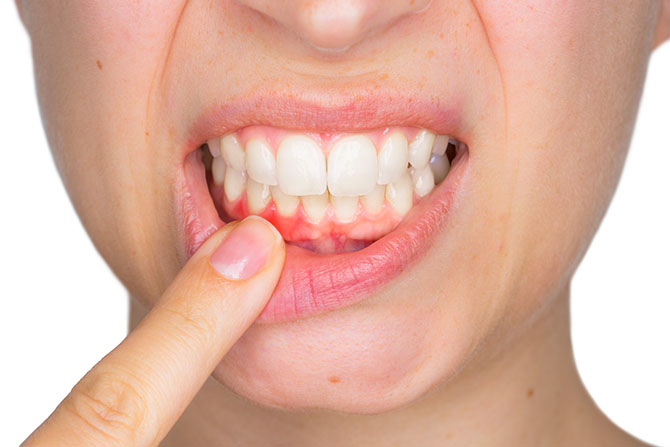
Overview
Symptoms
Causes
Prescription
Health Tips
Gingivitis is a swelling or inflammation of the gum tissue. If gingivitis is not corrected, 30 percent of all cases will become periodontitis, a condition where bacteria has spread from the gums to the bones, possibly resulting in lost teeth, an eroded jaw bone, and the need for dental surgery.
In the past, gingivitis did not cause much concern, but a study conducted in 1998 found that compared to men with healthy gums, those with gum disease were four and a half times more likely to have heart disease. The connection is thought to be due to bacteria entering the bloodstream through the gums.
Another study discovered that people with gum disease had 50 percent more plaque buildup in their carotid arteries than in people with healthy gums. Plaque buildup is a major risk factor for stroke. In June 2000, it was announced that a study observing 1000 pregnant women discovered premature deliveries were eight times more likely if they had gum disease.
The bacteria that causes gingivitis has been found in the brains of Alzheimer’s patients, according to a study published by Science Advance in January 2019.
Symptoms
Symptoms of gingivitis may be mild and go unnoticed.
- Continual bad breath may be present
- Gums become bright red, tender, swollen
- Gums bleed readily when flossing or brushing
- Gum tissue withdraws from the teeth, causing receding gums
- Sensitive teeth
Causes
Bacteria that has not been removed by brushing and flossing sits under the gum line and eventually leads to infection.
Other factors that can contribute to gingivitis are:
- Brushing too hard
- Certain medications
- Crooked teeth
- Dental work that is too loose
- Diets that are high in refined carbohydrates and sugar
- Dry mouth
- GERD or acid reflux
- Genetics
- Hormonal changes
- Nutritional deficiencies
- Smoking
- Stress
- Weakened immune system
Veterans who suffer from post-traumatic stress have a higher rate of gum disease, including gingivitis.
Elevated hormones during pregnancy exaggerate the body’s response to plaque in the mouth, thus increasing the likelihood of getting gingivitis. If good oral hygiene is practiced, this should not become a problem.
Diabetics are known to be more prone to gingivitis than non-diabetics. However, when diabetes is well controlled, gingivitis is kept in check.
Prescription for Health
| Nutrient | Dosage | Action |
|---|---|---|
| Coenzyme Q10 | 300 to 500 mg daily | Has been shown to work as well as scaling and root planing |
| Oil of oregano | Three drops three times daily | Antibacterial and antifungal |
| Tea tree oil mouthwash | Gargle and swish twice daily | Antibacterial and antifungal |
| Goldenseal | 20 drops daily ensure an 8 to 10 percent berberine content | Acts as an antibacterial |
| Cranberry juice (unsweetened) | Drink throughout the day | Prevents bacteria from sticking to the teeth and gums |
| Sage tea | Drink throughout the day | Soothes inflamed gums, is antioxidant and anti-inflammatory |
| Moducare sterols and sterolins | One capsule three times daily | Regulates immune function, enhances bacteria fighting ability, decreases inflammation and reduces the effects of stress |
Health Tips to Enhance Healing
- Avoid processed and refined foods.
- Brush tongue or use a tongue scraper to remove the bacteria that are hiding in the mucous coating.
- Chew gum containing baking soda. It helps eliminate plaque and reduce gingivitis.
- Drink plenty of pure, filtered water daily. For every juice, alcoholic, or caffeinated beverage consumed, drink another glass of water.
- Eat a well-balanced diet that focuses on natural, whole foods such as whole grains, fresh fruits and vegetables, legumes, nuts and seeds, and fresh fish.
- Floss at least once every two days to remove plaque buildup under the gum line.
- If flossing is impossible to incorporate into a nightly routine, there are toothbrushes for sale that emit acoustic energy. These may clean in areas not reachable by flossing.
- Oral piercings increase the risk of infection, so extra attention should be paid to oral hygiene.
- Stop smoking. Tobacco leaves a film of tar on the tongue, teeth, and gums that can make infections worse and delay healing. It can also lead to oral cancer.
- Visit a dentist once every six months to remove hidden plaque in hard-to-reach areas.
- When unable to brush, try fizzy tablets that have sodium bicarbonate, citric acid, and silicon dioxide. They bubble up to remove leftover food particles. Or use a toothpick.










